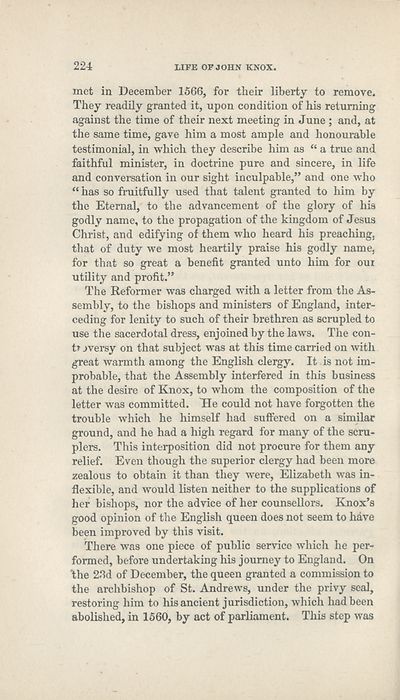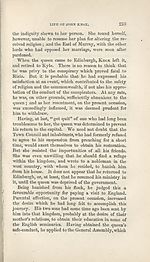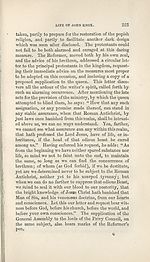Download files
Complete book:
Individual page:
Thumbnail gallery: Grid view | List view

224
LIFE OF JOHN KNOX.
met in December 1566, for their liberty to remove.
They readily granted it, npon condition of his returning
against the time of their next meeting in June ; and, at
the same time, gave him a most ample and honourable
testimonial, in which they describe him as “ a true and
faithful minister, in doctrine pure and sincere, in life
and conversation in our sight inculpable,” and one who
“ has so fruitfully used that talent granted to him by
the Eternal, to the advancement of the glory of his
godly name, to the propagation of the kingdom of Jesus
Christ, and edifying of them who heard his preaching,
that of duty we most heartily praise his godly name,
for that so great a benefit granted unto him for oui
utility and profit.”
The Reformer was charged with a letter from the As¬
sembly, to the bishops and ministers of England, inter¬
ceding for lenity to such of their brethren as scrupled to
use the sacerdotal dress, enjoined by the laws. The con-
tt jversy on that subject was at this time carried on with
great warmth among the English clergy. It is not im¬
probable, that the Assembly interfered in this business
at the desire of Knox, to whom the composition of the
letter was committed. Be could not have forgotten the
trouble which he himself had suffered on a similar
ground, and he had a high regard for many of the scru-
plers. This interposition did not procure for them any
relief. Even though the superior clergy had been more
zealous to obtain it than they were, Elizabeth was in¬
flexible, and would listen neither to the supplications of
her bishops, nor the advice of her counsellors. Knox’s
good opinion of the English queen does not seem to have
been improved by this visit.
There was one piece of public service which he per¬
formed, before undertaking his journey to England. On
the 23d of December, the queen granted a commission to
the archbishop of St. Andrews, under the privy seal,
restoring him to his ancient jurisdiction, which had been
abolished, in 1560, by act of parliament. This step was
LIFE OF JOHN KNOX.
met in December 1566, for their liberty to remove.
They readily granted it, npon condition of his returning
against the time of their next meeting in June ; and, at
the same time, gave him a most ample and honourable
testimonial, in which they describe him as “ a true and
faithful minister, in doctrine pure and sincere, in life
and conversation in our sight inculpable,” and one who
“ has so fruitfully used that talent granted to him by
the Eternal, to the advancement of the glory of his
godly name, to the propagation of the kingdom of Jesus
Christ, and edifying of them who heard his preaching,
that of duty we most heartily praise his godly name,
for that so great a benefit granted unto him for oui
utility and profit.”
The Reformer was charged with a letter from the As¬
sembly, to the bishops and ministers of England, inter¬
ceding for lenity to such of their brethren as scrupled to
use the sacerdotal dress, enjoined by the laws. The con-
tt jversy on that subject was at this time carried on with
great warmth among the English clergy. It is not im¬
probable, that the Assembly interfered in this business
at the desire of Knox, to whom the composition of the
letter was committed. Be could not have forgotten the
trouble which he himself had suffered on a similar
ground, and he had a high regard for many of the scru-
plers. This interposition did not procure for them any
relief. Even though the superior clergy had been more
zealous to obtain it than they were, Elizabeth was in¬
flexible, and would listen neither to the supplications of
her bishops, nor the advice of her counsellors. Knox’s
good opinion of the English queen does not seem to have
been improved by this visit.
There was one piece of public service which he per¬
formed, before undertaking his journey to England. On
the 23d of December, the queen granted a commission to
the archbishop of St. Andrews, under the privy seal,
restoring him to his ancient jurisdiction, which had been
abolished, in 1560, by act of parliament. This step was
Set display mode to:
![]() Universal Viewer |
Universal Viewer | ![]() Mirador |
Large image | Transcription
Mirador |
Large image | Transcription
| Antiquarian books of Scotland > Scotland/Scots > Life of John Knox ; and, The life of Alexander Henderson > (242) |
|---|
| Permanent URL | https://digital.nls.uk/131835208 |
|---|
| Description | Thousands of printed books from the Antiquarian Books of Scotland collection which dates from 1641 to the 1980s. The collection consists of 14,800 books which were published in Scotland or have a Scottish connection, e.g. through the author, printer or owner. Subjects covered include sport, education, diseases, adventure, occupations, Jacobites, politics and religion. Among the 29 languages represented are English, Gaelic, Italian, French, Russian and Swedish. |
|---|

